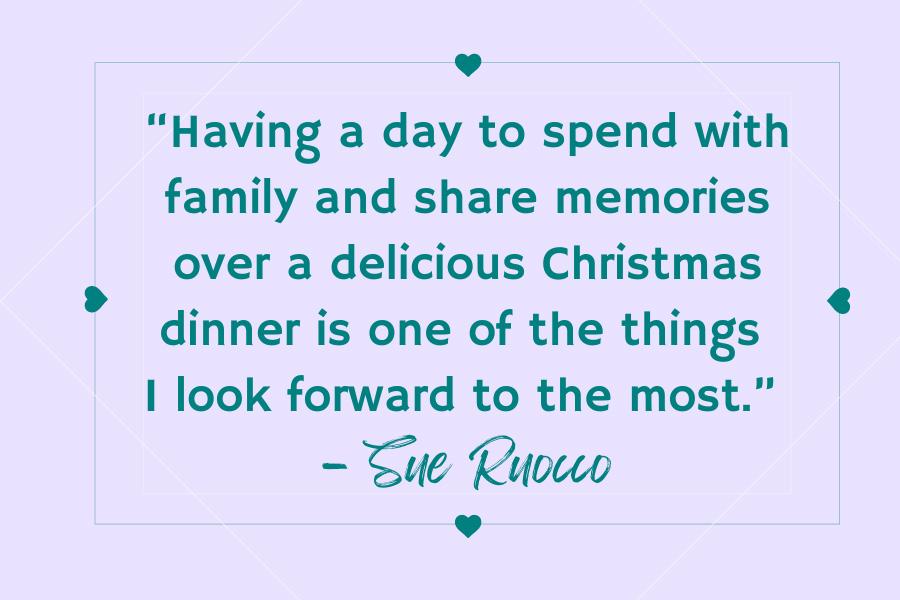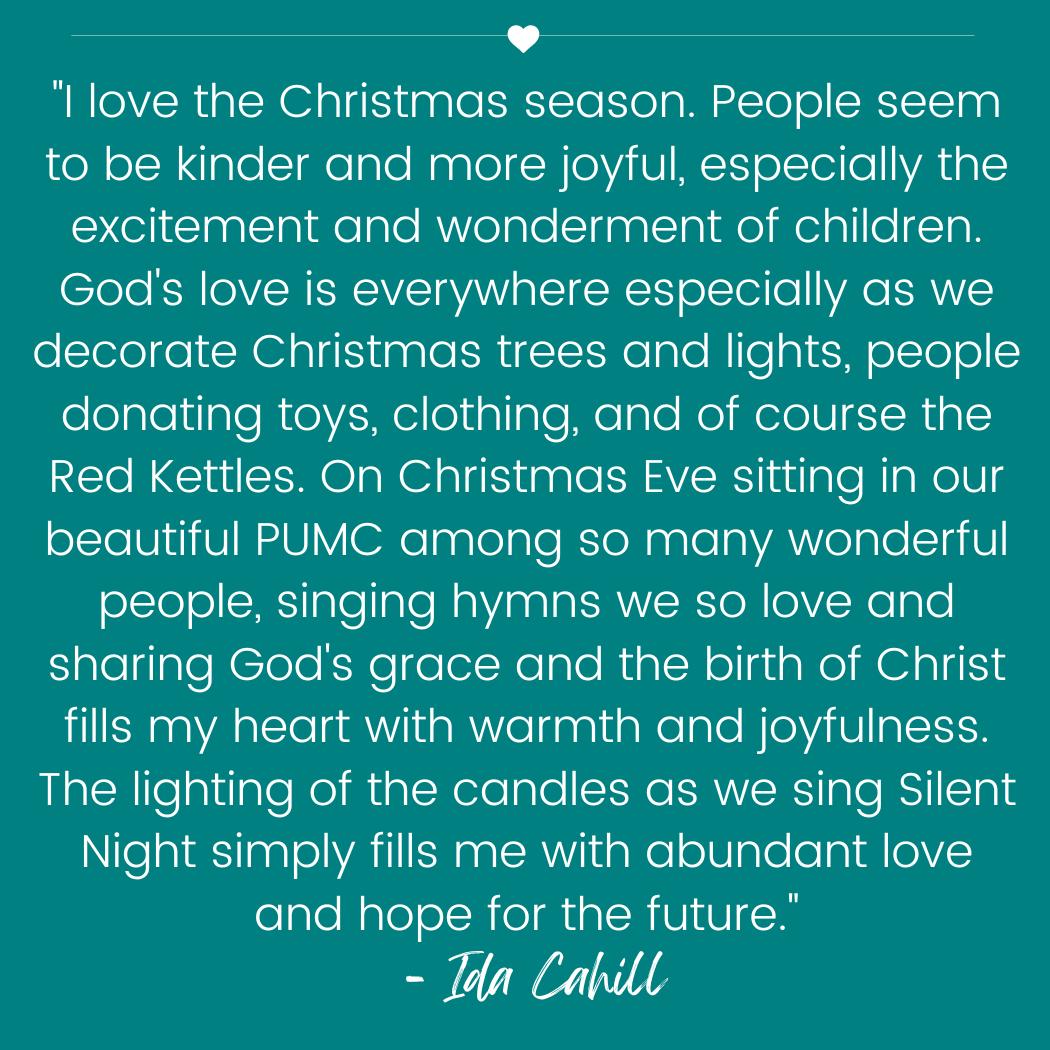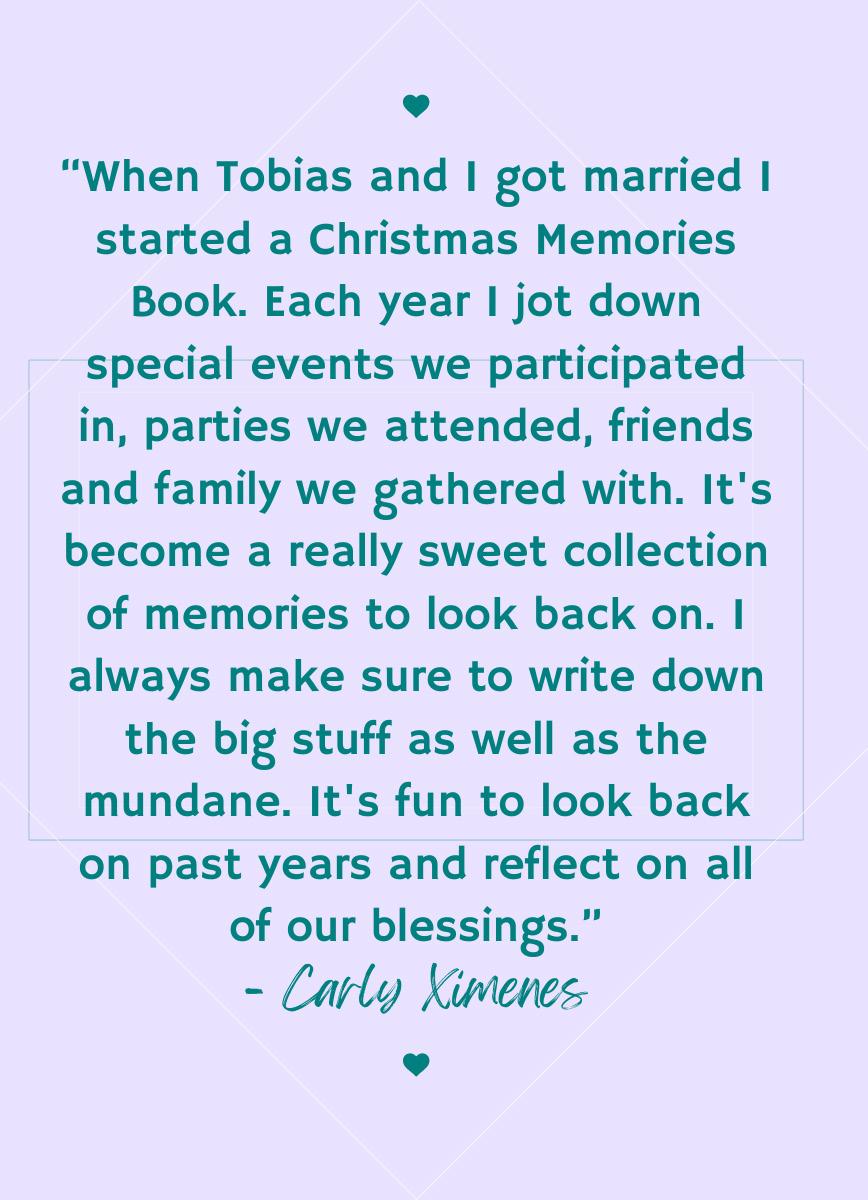AN ADVENT OF ABUNDANCE 2022 ADVENT DEVOTIONAL GUIDE
 Grace Upon Grace
Grace Upon Grace
Thank you to all of those who contributed to this devotional guide, including but not limited to Rev. Jenny Smith Walz, Sonja Arevalo, Dana Dreibelbis, Barbara Fox, Mikaela Langdon, Kate Lasko, Kathy Burt, Yvonne Macdonald, and Isabella Dougan. This booklet was edited by Evangeline Burgers.
Week One: Practicing Peaceful Abundance 10 Week Two: Practicing Hopeful Abundance 14 Week Three: Practicing Joyful Abundance 20
Week Four: Practicing Love-Filled Abundance 24
Week Five: Practicing Grace-Filled Abundance
Contents 6
From the Pastor
REV. JENNY SMITH WALZ

Dear Beloved Princeton United Methodist Church Community,
“From his fullness we have all received, grace upon grace.” ~John 1:16
There is perhaps no time in the year that feels as scarce as the season just before Christmas. Advent can make us feel like there’s not enough time, energy, money, attention, or resources to get all the things done that we want or feel like we should do. Guilt creeps in, along with a sense that maybe we ourselves aren’t enough. For many this is the loneliest, hardest time of the year. And even when the whole season ventures into excess - parties, food, gifts, spending, and more - it can often still feel scarce, like something’s missing.
Yet, there is no greater expression, evidence, or embodiment of God’s abundant grace than the incarnation of Jesus Christ. Our need for Jesus is deeply evident, even as we prepare for Christ’s coming. We need Jesus to be God’s presence among us. We need Jesus to show us how God loves. We need Jesus to put things into perspective, to keep our eyes, hearts, and minds set on God’s kingdom of love, justice, and peace. We need Jesus to show us how to love and forgive one another. We need Jesus to proclaim our belovedness, over and over again.
What if we were to tune into our need for Jesus this Advent? What if we were then to intentionally practice abundance, even in the midst of this “season of scarcity”? What if we were able to focus on God’s abundant peace, hope, joy, and love this season? How might it change us and our Christmas celebrations?
Abundance is one of our “Jubilee Practices” that we’ve claimed as part of the vision God is leading us into. Remember what happened in the Sinai Wilderness, after the Hebrew people had been led by Moses out of enslavement in Egypt? God’s people were certain they would die of thirst and hunger. Yet they found that God provided water from a rock, gave them manna and quail. God’s abundance sustained them, so much so, that they built in reminders of this into their worship practices, into their rhythms of jubilee. The prophets, like Isaiah, picked up this jubilee thread and proclaimed God’s abundant hope, peace, and joy to those exiled from their home in Jerusalem. And Jesus carries this jubilee thread of abundance into his ministry, showing us over and over again how abundant God’s love and grace are, showing us how to live into the fullness of God’s abundance.
We need Jesus to show us the abundance of God’s love and all that God shares with us. We need Jesus to show us that when we share, when we listen, when we are connected and in communion with God and one another, God’s abudance becomes apparent all around, repairing a broken world full of fear and scarcity. We need Jesus to free us for the fullness of life, for it is indeed that “from his fullness we have received grace upon grace.”
Grace Upon Grace
“The word that Isaiah son of Amoz saw concerning Judah and Jerusalem. In days to come the mountain of the Lord’s house shall be established as the highest of the mountains, and shall be raised above the hills; all the nations shall stream to it. Many peoples shall come and say, ‘Come, let us go up to the mountain of the Lord, to the house of the God of Jacob; that he may teach us his ways and that we may walk in his paths.’ For out of Zion shall go forth instruction, and the word of the Lord from Jerusalem. He shall judge between the nations, and shall arbitrate for many peoples; they shall beat their swords into plowshares, and their spears into pruning-hooks; nation shall not lift up sword against nation, neither shall they learn war any more. O house of Jacob, come, let us walk in the light of the Lord!”
Isaiah 2:1-5
There is no greater expression, evidence, or embodiment of God’s abundant grace than the incarnation of Jesus Christ. Jesus is Emmanuel, God with us. We begin Advent by focusing on Jesus, our need for Jesus, and the peace that Jesus brings.
Try this conversational prayer practice as a way to connect deeply with your own need and longing and for Jesus who is both with us already and the one we await.
Draw a vertical line down the middle of your page. Then read Isaiah 2:1-5.
Week One
Have a conversation with Jesus, the Prince of Peace, about the peace you long for. On the left side of your page write a brief question, thought, or feeling you’d like to talk about with Jesus. Respond to the passage or reflect on something happening in your life or the world. Listen for Jesus’s response. Write down what you hear on the right side of the page. And then continue with your next part of the dialog on the left. Let it be a conversation between you and Jesus. Take your time, seeking, listening for that voice of Jesus. Continue until you feel ready to stop or put it down and pick it up again later.
Give thanks for the experience, whatever it brings. Make this practice yours. Bring other conversations to Jesus. Use art or music instead of words. Share with others something of your experience, particularly as you seek to tune into the voice of Jesus.

Peace - 6
Grace Upon Grace

Christmas or Clausmas?
BARBARA FOX
Santa Claus loomed large over Christmas when I was growing up. I tried to unmask him when I raised my children. Who could be more important than the Christ Child? How will the kids believe us about Christ when we lie to them about Claus?

My mother wouldn’t have it. My husband agreed.
My mother – who was at heart a six-yearold – put a lot of energy into the myth. Her “Santa Claus” closet had a lock on it. When we were young, if the gift was from Claus, it was wrapped in paper never seen before, never seen on other gifts, and never to be seen again. Claus brought stockings, stuffed to bulging, to our beds when we were sleeping.
As a mom I often succumbed to the temptation to make Santa look good. I agonized for weeks over which educational toys would fit my budget and enlarge the stash under the tree. Sometimes – like our former landlords in Germany – I even displayed all their old stuffed toys and dolls around the tree to make the stash seem bigger.
Don’t get me wrong, the Claus-mas spirit is good in its own way. People who are not inspired by Jesus can be infused by the Claus-mas spirit, seeking out just the right gift for their loved ones and giving money to the needy. To be loving and charitable in the month of December is to be commended, but marshaling one’s resources for the display under the tree is nowhere near like preparing
one’s heart to celebrate the birth of our Savior.
That’s easy to preach, you might say. You’re right. I’m not a harried parent. Now I am an elder, no longer responsible for being sure that everyone has the right gifts. We all have ways, however, to reduce dollars spent on “things” and enhance the Christ part of Christmas.
Some might suggest that our time budget is as important as our money budget. For my mother, sharing the Santa joy with her parents took priority over attending church. On Christmas Eve my father would load the car with the contents of Santa’s sleigh for the night-time drive from Baltimore to Philadelphia so that the grandparents could enjoy watching my sister and me discover Santa’s largesse on Christmas morning. We never got to stay home or go to the Christmas Eve service.
When my husband George and I lived in Philadelphia, we dutifully made that trip in reverse but on our own terms. George was in charge of ushers at a little Moravian Church and I was one of two altos in an eight-person choir. So on Christmas Eve after packing the presents for Baltimore, we drove to church. The ushers served Moravian sugar cake to the congregation in the pews and distributed lighted beeswax candles, while I sat in the choir and watched my children fall asleep on the front pew. Santa did not get to crowd out Jesus.
Peace - 8
Grace Upon Grace
“A shoot shall come out from the stock of Jesse, and a branch shall grow out of his roots. The spirit of the Lord shall rest on him, the spirit of wisdom and understanding, the spirit of counsel and might, the spirit of knowledge and the fear of the Lord. His delight shall be in the fear of the Lord. The wolf shall live with the lamb, the leopard shall lie down with the kid, the calf and the lion and the fatling together, and a little child shall lead them. The cow and the bear shall graze, their young shall lie down together; and the lion shall eat straw like the ox. The nursing child shall play over the hole of the asp, and the weaned child shall put its hand on the adder’s den. They will not hurt or destroy on all my holy mountain; for the earth will be full of the knowledge of the Lord as the waters cover the sea. On that day the root of Jesse shall stand as a signal to the peoples; the nations shall inquire of him, and his dwelling shall be glorious.”
Isaiah 11:1-3a; 6-10
This week we focus on hope, the hope we have in the Incarnation. Hope is elusive: hard to define, difficult to hold on to. There’s no formula or map that can guarantee we’ll find it. Yet we can practice creating conditions that welcome and foster hope, and we can ask God and others for help in doing so. Try this practice to create a hopeful, liberating mindset.

Read Isaiah 11:1-3a, 6-10:
Week Two
As you read, write down any thoughts that come to you that squash hope, that tell you that Isaiah’s hopes can’t possibly become reality. As you think about how Isaiah’s words might translate to your experience in our world today, write down any thoughts or beliefs that limit you - or God - as you long for Jesus and the kingdom of God.
Once you’ve got a number of thoughts or beliefs down on paper, transform each of those into a statement that opens up possibility, hope. To do this, try adding an “unless” to your sentence. Or try changing the sentence from a negative to a positive. For example:
Transform “Nothing ever changes.“ to “Nothing will ever change, unless I choose to do something different.”
Are you being invited to post any of your hopeful statements in places you can see them daily? Keep practicing, seeking to notice when you are dwelling in a hope-deprived thought, and transforming it as quickly as you can. Who might you share one or more of your hopeful statements with? Who might you ask to tell you when they hear you speak in hope-limiting ways?
Hope - 10
Grace Upon Grace

“One of our Christmas traditions is celebrating St Nikolaus Day, which is a typical German tradition. On the eve of December 5th, our boys leave a shoe or a boot by the door in hopes that St. Nikolaus will come and fill it with goodies (usually tangerines, chocolate & a small gift.) Our boys would set out the biggest or tallest boots in our home in hopes of getting the most candy & surprises! It was a wonderful way to kick off our Christmas season.” - Cindy Gessner
“During Advent, I experience God’s abundance here, at PUMC. Many years ago, when I was a member of a different United Methodist Church, we had an adult study on taking the stress out of Advent and focusing on the true meaning of Christmas. I took that to heart, and still do. For me I feel the abundance of Advent here, in this place, not at malls or doing online shopping or at holiday parties. It is here, in this place, that I encounter the abundance of the promise of the Christ child through our children’s voices, through our Advent night activities, through our choir concerts, through our support of those in need, through Christmas Eve services. It is here that I experience the abundance of being with those with whom I share my faith and joy and love, the abundance of my church family.” - Iona Harding


“When I was growing up, my mother would stay up very late to wrap everyone’s gifts and place them under the tree. Even has an adult, she would still stay up late and wrap all my gifts and place them under the tree for me. I continue this tradition every year. I sit on my living room floor, play Christmas music, and fill my house with her memory every year. I honestly feel the beauty and joy of Christmas through her spirit. Her presence brings me peace and reminds me of God’s abundant love. He blessed me with a beautiful and loving mother. Through God, I feel her spirit everyday, but especially at her favorite time of year- Christmas!” - Heather Hadley

Hope - 12
Grace Upon Grace
“The wilderness and the dry land shall be glad, the desert shall rejoice and blossom; like the crocus it shall blossom abundantly, and rejoice with joy and singing. The glory of Lebanon shall be given to it, the majesty of Carmel and Sharon. They shall see the glory of the Lord, the majesty of our God. A highway shall be there, and it shall be called the Holy Way; the unclean shall not travel on it, but it shall be for God’s people; no traveler, not even fools, shall go astray. No lion shall be there, nor shall any ravenous beast come up on it; they shall not be found there, but the redeemed shall walk there. And the ransomed of the Lord shall return,and come to Zion with singing; everlasting joy shall be upon their heads; they shall obtain joy and gladness, and sorrow and sighing shall flee away.”
Isaiah 35:1-2;8-10
Advent is a season of joy. We anticipate the joy of the incarnation, when we sing: “Joy to the world, the Lord is come.” We try to remember that we are created for joy, as Hafiz says, yet the stress and pressures of the season can make it difficult to experience joy, much less spread joy to others.

This week we look at our gift-giving practices. While there is often excess this time of year, in terms of food, spending, waste, giving and receiving impersonal gifts, and more, there’s not always abundance. Try this gift-giving practice to foster joyful abundance in your Christmas observance this year.
Week Three
Read Isaiah 35:1-2, 8-10.
Look at your Christmas gift-giving list. Even if you’ve already crossed everything off, take a look again. The Spirit may move you to add or change something - or prepare for next year. Think of the people you are giving to. Pray for them. Ask God to help you become aware of how your giving to them might be like abundant blooms in the desert or a clear path home after much time away. Ask what your people actually need spiritually, emotionally, relationally, physically. Ask how you might add to their joy.
Don’t be afraid to change your giftgiving plan. Maybe you give the gift of time or an experience. Maybe your gift is a relational one or one crafted by your hand. Maybe there is nothing to wrap or mail or it takes a different shape than usual. Maybe these are the most personal, personalized gifts you’ve ever given.
It might take some explaining if you change your approach to gift giving. Christmas is full of expectation and wish lists, after all. So tell people why you are giving this way and how you came to the gift you ultimately chose.
Grace Upon Grace
Joy - 14
15 Abundant Alternatives
KATHY BURT AND BARBARA FOX
1. Add family prayer to holiday rituals. Cutting your live tree? Say a thank you prayer. Baking cookies? Bless the batter. Heading to the mall? Sing a carol before you leave.
2. Learn something by heart. Methodists follow the spiritual tradition of singing Advent “waiting hymns” during December, saving the joyful carols for after Christ’s birth. But meanwhile you and your family could be learning.
3. Change the timing to enhance the spiritual experience. German families save the glory of the Christmas tree for Christmas Eve. While almost everyone is at church, the Christ child decks the tree in all its glory. One way to adapt that to our custom is suggested by Vinette Jones: to wait until Christmas Eve “to decorate with lights that flicker all around the house, watching the joy in a child’s eye as they watch all the colors go on and off.”
4. Change the paradigm. Dutch children get their presents from St. Nicholas on December 6, so that Christmas is a completely spiritual holiday. Here, a family can spread the toy-buying budget over 12 months, perhaps “Christmas in July” or quarterly.
5. Limit the list. Among all the cousins, uncles and aunts -- draw names for one present each. Instead of mailing Christmas cards to friends at PrincetonUMC, participate in the Christmas Card exchange by sending one card for posting on the bulletin board along with the money you would use on cards and stamps.
6. Promise or encourage. The classic IOU present is the book of coupons good for chores or favors. Fill a jar with encouraging notes, for when the recipient is discouraged.
7. Make something as a spiritual message. Starting in July, finishing just in time for Christmas. Carter Cunningham used to can 60 jars of marmalade for her son Patrick’s Army unit: “I put little red and green calico toppers on them; I just wanted them to have a little sweet taste of Christmas joy and prayed they would meet the Christ Child on their journeys. Most of them didn’t have Christmas off.”
8. Buy from a charity. Like the beautiful $10 placemats from FEBA, made by Congolese women, available from PUMC member Susan Lidstone.
9. Give an IOU for an experience. Jeanette Klink likes to gift tickets to something in New York. Tickets – whether to the movies, a Broadway show, a water park, a concert series, a summer camp, or to Paris – can bring you closer to loved ones and strengthen the relationship .
10.“Give a cooking experience,” suggests Isabella Dougan. “Something that we love doing for family (especially those who don’t have a lot with which to celebrate Christmas) is to gift them a traditional family menu and a cake recipe. We put all the ingredients in a gift basket. The dry ingredients are pre-measured and added to the basket. Also included in the basket are the recipe instructions. It is up to them to do the cooking, something they love doing, making sure it comes out right. We love to watch the happiness on their faces when they brag about their cooking ability. Of course, we also add some drinks to put them in the right mood.”

11. Go Christmas caroling. Isabella Dougan adds, “Together with a group of friends, we practice singing Christmas songs. We then go to other people’s homes, hospitals, prisons, and old people’s centers and sing them Christmas songs. They love it. Singing for others is a Christmas gift that doesn’t cost much. Caroling is also a great way to spread Christmas cheer.”
12.Offer the gift of time. Create a set time (a morning, an afternoon) to learn how to use a basic tool; making a simple food item and have a picnic; set up a ‘tent’ for playtime; sew on a button together; go to a sporting event; make clothing out of a pillowcase; explore a wooded area; prepare and plant a garden; or learn how to do a simple repair. Then have ‘tea time’ together and tell a story ‘I remember when I was your age...”
13. Write notes, poems, or a story. “Why I like you.” “You light up my life when....” Give/send it to that special person.
14. Find a nearby (safe) hill. Roll down the grassy hill on your tummy, slide down the snowy hill with a sled or saucer.
15. Plan a trip together. For a holiday or birthday, or trip – plan it together, everything from decorations to activities to food.
Joy - 16
Grace Upon Grace

Advent Joy
 YVONNE MACDONALD
YVONNE MACDONALD
As a past Youth and Children Choir director my Advent celebrations have always been largely in the church. One of my most treasured activities has always been the annual Advent Pageant when the children present the Christmas Story for the congregation in dramatic form. When encouraging the parents and friends to volunteer help, I would always say ‘this is what Advent is always about for me.’ Working together like this has brought such immense joy and countless enduring friendships. Peggy Fullman, Richard Gordon, Judy Miller, Malisa Langdon to name only a few of the saints who gave countless hours of devoted service and of course those great Sunday school teachers of past years. Not forgetting the countless children who would
dream of being Mary, Joseph or some other lead part but would happily accept a lesser role for the good of the team. Though I no longer have responsibility for this Advent celebration, I’m delighted to be able to help Tom by costuming the children for the current presentations. At home my Advent preparations have been limited due to the amount of time I was spending on church preparations. I try to decorate my house for the Christmas celebration putting up one thing at a time each week following Thanksgiving. And I really value the special Advent meditations that are put out by the church for devotional time. Advent truly is hope, peace, joy and love.
“I always get such joy from placing the ornaments on the tree. Each of my ornaments holds a memory. Memories from our children growing up to memories of places we have visited over the years. Fond thoughts of old and new friends when we hang their gifted ornaments. Now we have the added joy of receiving hand-made ornaments from our grandchildren. I count my blessings as I place each memory on the tree.”
– June Chamberlain
Grace Upon Grace
– Sonja Arevalo
“Our family would love for every day to be Christmas! So, in an effort to extend the Christmas season as long as we can, we fill an Advent calendar with different activities & open 1 a day from Dec 1st through Dec 24th (popcorn & a Christmas movie, bake Christmas cookies together, drive around to look at Christmas lights, sip hot chocolate outside, etc.) We also celebrate the 12 days of Christmas! We fill each stocking with 12 small gifts & we all open 1 a day from Dec 26th through Jan 6th (Epiphany). Such a joyful time.”

Joy - 18
“Again the Lord spoke to Ahaz, saying, Ask a sign of the Lord your God; let it be deep as Sheol or high as heaven. But Ahaz said, I will not ask, and I will not put the Lord to the test. Then Isaiah said: ‘Hear then, O house of David! Is it too little for you to weary mortals, that you weary my God also? Therefore the Lord himself will give you a sign. Look, the young woman is with child and shall bear a son, and shall name him Immanuel. He shall eat curds and honey by the time he knows how to refuse the evil and choose the good. For before the child knows how to refuse the evil and choose the good, the land before whose two kings you are in dread will be deserted.”
Isaiah 7:10-16
Love is the reason for the incarnation. God loves us so much that God came to dwell among us in the flesh. God desires nothing more for us than that we love God with all our heart, mind, soul, and strength, and that we love others as ourselves. Jesus came to teach us, to show us just that. In Jesus we know ourselves (and all others) to be God’s beloved.
Jesus proclaims his own belovedness and that of each one he is with in his words, his actions, his very being. He made space for people. He told stories about the way God loves. He showed how God loves by healing and feeding, by washing feet and forgiving people, by going to the people society didn’t love and bringing them into community. He laid down his life to show us the lengths that God will go to in order to be with us, to proclaim our belovedness, to repair the brokenness and separation between us and God, between us and one another.
Try this love-filled practice through this fourth week of Advent and throughout the Christmas season.

Read Isaiah 7:10-16.
Take a moment and make note of the signs of God’s love and presence you have received this season, or through this year. What signs of love have you received from other people in your life? What awareness do you have of the abundance of love, energy, resources, time, food, connection in your life?
And then do one or more of the following:
• Tell someone about this awareness, these signs, the experiences of love, presence, and abundance.
• Give God thanks! Share with God how you are feeling and what you are grateful for. Give a gift of joyful response to God’s grace. Sing praises to God. Serve someone else as a joyful response to God’s grace. What are other ways you show gratitude to God?
• Give others thanks! Tell someone a story of how they helped you experience love and abundance. Tell them what their love means to you. Tell or show them you love them. Tell them through a letter or email, a song or an artistic expression. Tell them over coffee, a phone or video call, or on a walk. What are other ways to show gratitude?
Grace Upon Grace
Love - 20
Week Four

Ringing at the Red Kettle
DANA DREIBELBIS
Bell-ringing with the Salvation Army Red Kettles is an activity full of grace, and a big way to build and nurture a faith where we are taught to love the least, the unwanted, the marginalized - - ourselves included. Started at PUMC by the indomitable Larry Apperson, many dozens (likely upward to 200) of people have taken shifts as bell-ringers, rain, snow or shine. No one ever complains, and everyone walks away with a smile on their face.
In the summer of 1976 I spent a long summer at a mission hospital in rural India. Landing in what is now Mumbai, I was given a tour of the city by the missionary host. The highlight was a stop at a Salvation Army hospital. It was unknown to any tourists and worked with the worst medical cases among the Dalits, (aka the untouchables). There I had a long conversation (in translation to Marathi) with a woman, named Kalpana, who in her late 20s was incurably paralyzed from the neck down. Her faith testimony, her joy in life with Jesus, is the most moving witness I have ever heard. Imagine how my world changed for the better to see such faith in action, both the caretakers and the cared-for. Nothing (visibly) like the cushy suburb like where I had grown up and where I live now.
Since 1976 I have kept a lookout for Salvation Army operations and always find them in the most destitute, hardscrabble neighborhoods. They have a spiritual, global genius for seeking the lost, the broken, the hopeless and they serve year after decade after century. When my wife Leslie and I became part of the PUMC fellowship it was great to learn that Larry Apperson had the connection with them in place. Trenton is far from being as bad-off as the neighborhood I visited in Mumbai, but the principles are the same: high crime, few resources, little hope, many hardships.
My family, including our four children with two spouses, and this year our now-four granddaughters, ring annually and it always brings home the love and hope that we share through Jesus. Yes, the funds raised make a huge difference for the better in Trenton, where all are served without qualification. Nevertheless, the greater good seems to be watching ‘this little light of ours (“mine”) kindled in the eyes of all ages and circumstances, from a few University professors I recognize, to families, to a cold, poorly-dressed person at Palmer Square waiting for a bus who walks over to the
kettle, struggles for a minute or so, digs out a nickel and drops it in the kettle.
In our suburban world there seem to be few opportunities when we can personally, publicly proclaim our faith in the cause of helping others.“Ringing the bell is now part of our family tradition,” says Sharon DiStase (daughter of Larry Apperson). We have been ringing as a family since PUMC partnered with Salvation Army. It has allowed the girls (and John and me) to see people come together and give. It is truly a special time each year.”
“As a child I was dedicated to the Lord by my grandfather, an officer in the Salvation Army,” says Judy Algor, “so bell ringing for our church has special meaning for me.”

“Tending a kettle before Christmas is far and away the most heartwarming activity I ever participated in,” says Marv Ostberg. “That is because of the joy in the faces of the children as they put their own money in the kettle. Often returning with more from their childreninspired parents.”
Pam Ewer agrees: “God’s Grace is clearly evident as I ring for the Salvation Army. At a time of the year when there is always so much extra to do, putting aside time for others in such a simple way is what we are called to do. It is time well spent for a worthwhile cause.”
As Jesus notes, “When you help the least of these, you help me.”
Grace Upon Grace
Love - 22
“In the beginning was the Word, and the Word was with God, and the Word was God. He was in the beginning with God. All things came into being through him, and without him not one thing came into being. What has come into being in him was life, and the life was the light of all people. The light shines in the darkness, and the darkness did not overcome it. There was a man sent from God, whose name was John. He came as a witness to testify to the light, so that all might believe through him. He himself was not the light, but he came to testify to the light. The true light, which enlightens everyone, was coming into the world. He was in the world, and the world came into being through him; yet the world did not know him. He came to what was his own, and his own people did not accept him. But to all who received him, who believed in his name, he gave power to become children of God, who were born, not of blood or of the will of the flesh or of the will of man, but of God.
And the Word became flesh and lived among us, and we have seen his glory, the glory as of a father’s only son, full of grace and truth. (John testified to him and cried out, “This was he of whom I said, ‘He who comes after me ranks ahead of me because he was before me.’”) From his fullness we have all received, grace upon grace. The law indeed was given through Moses; grace and truth came through Jesus Christ. No one has ever seen God. It is God the only Son, who is close to the Father’s heart, who has made him known.
John 1:1-18
Merry Christmas! Happy Feast of the Incarnation! Joy to the World, the Lord is come! The Word became flesh and lived among us! Christmas is now upon us! This twelve-day season of Christmas (December 25-January 5) is one we often overlook as much of our culture focuses on wrapping up one calendar year and beginning another.
In this short season focused on the Incarnation of Christ, continue to practice abundance, bringing forward the practices you’ve explored through Advent, cultivating habits and a way of looking at the world that can move forward with us in all areas of our lives, into Epiphany, Lent, Easter, and the year beyond.
Abundance isn’t about our own prosperity or having our wishes granted. It’s also not about denying the real need in the world and the truth of our human condition, which is ever in need of God’s grace.
Abundance is about living our own belovedness and recognizing the belovedness of others. It’s about living in the “enoughness” of God’s grace, God’s love, and trusting that that grace flows through us, through others, through the connections between us, in ways that meet those real needs in the world. It’s about trusting that, by God’s grace, God indeed dwells among us, in the flesh, and that we are part of the mystery of the incarnation. It’s about living as the body of Christ, recipients and vessels of divine grace, knowing that we are enough, because God is enough. As John Edgar says, “We live inside a divine economy of abundance.”
Try this grace-filled abundance practice, which continues on p.27.
Read John 1:1-18.

Week Five
Grace
Upon Grace
Grace - 24

Take a moment (or several) and center yourself in God’s grace. Spend time a breath prayer or be silent in God’s presence. Sing or listen to a song that connects you with God’s love. Remind yourself in some way of your belovedness. Remember your baptism and be thankful. What are other ways you connect with God’s love for you?
Have a conversation with someone, aware of the presence of God’s grace with you both. Be curious. Ask them about their hopes, dreams, aspirations, values. Ask them about their gifts, their strengths, things they are most proud of and passionate about. Ask them how God is inviting them to feed and be fed, to build
God’s kingdom. Hold space for what they say. Make connections with your own hopes and experiences. Is there any way you might share help, ideas, support, resources, with one another? If not immediately, hold onto the conversation, what you hear and experience. Give God thanks for any experiences of grace you had.
Be intentional about having such conversations regularly. They can be short or long, with someone you just met or someone you’ve known for a long time. Be open! Be curious! Be abundant! Be grace-filled! And look for God’s grace dwelling among us.
“The best moments are when all four of our far-flung children return home for the holidays. On Christmas Day, four generations gather at our house to exchange gifts and share a festive meal. It’s always very hectic, but very special.” – Leslie Dreibelbis

 Grace Upon Grace
Grace Upon Grace
Grace - 26
 Grace Upon Grace
Grace Upon Grace













 YVONNE MACDONALD
YVONNE MACDONALD







 Grace Upon Grace
Grace Upon Grace